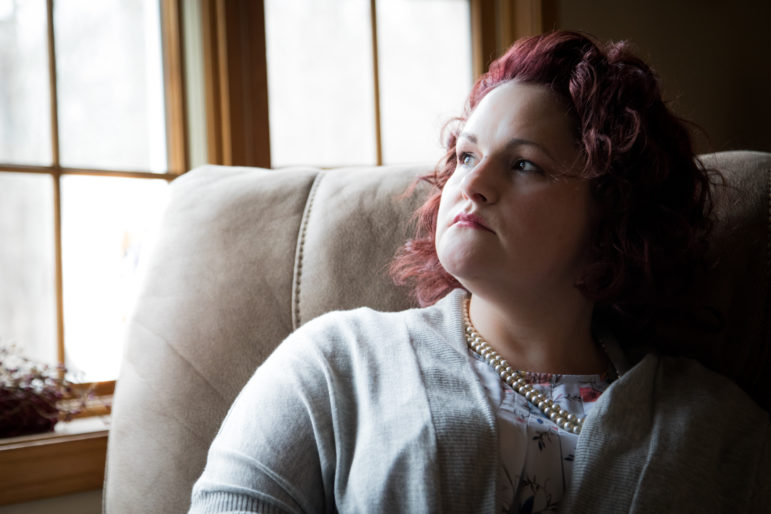By Kate Farrish
State nursing regulators have ordered two former licensed practical nurses to take a refresher course before they can get their licenses back following disciplinary action.
But there’s a problem: the only LPN refresher course approved by the state Department of Public Health won’t accept anyone with an active disciplinary order.

Carl Jordan Castro Photo.
Heather Delaney wants to get relicensed as a LPN, but is facing obstacles registering for a refresher course.
One of the nurses, Heather Delaney of Oxford, says she has beaten the addiction to the anti-anxiety drug Klonopin that caused her to alter a prescription in 2010 and can safely return to nursing. She agreed to a consent order with the state Board of Examiners for Nursing in 2016, only to be turned down by the approved program, at South Dakota State University, because of the order. Delaney was one of two nurses featured in a January 2018 C-HIT article on nurses and addiction.
Frustrated that DPH officials wouldn’t change her order, Delaney told the board in July about the dilemma she’s facing. It declined to revise her consent order but promised to look into the problem.
“Why require us to take a course that doesn’t exist?,” she said in an interview. “It’s made me virtually unemployable.”
DPH learned of the problem in 2017 and the board was told “immediately,” but board members have not changed their recommendations on consent orders since then, Christian D. Andresen, DPH’s section chief of Practitioner Licensing and Investigations, said in a statement.
Also, in October, the board unanimously approved a consent order that requires former LPN, Kokumo Lauray of Hartford, to take the refresher course. At the same meeting, the board recommended the course for a third former LPN seeking reinstatement, Herbert Terry III of Waterbury. The board will likely vote at a future meeting on Terry’s case.
Lauray and Terry could not be reached for comment, but Delaney said she can’t understand why the board would place others in the same situation.
“I’m very frustrated, and I’m angry that now, they’re doing it to other people,” she said.
The board’s chair, Patricia C. Bouffard, said the board members are concerned about the situation. “We’re very sympathetic,’’ she said. “The board recognizes that she (Delaney) has been placed in a kind of Catch-22, but we, as a board, can’t mandate compliance without an active consent order. We’re going around in circles.”
DPH’s Andresen said that requiring the course protects the safety of the public by ensuring that nurses returning to the field are competent to practice. He said DPH may consider revising consent orders if it can find another way for LPNs to prove their clinical competency. DPH is not aware of any Connecticut schools planning to offer an LPN refresher course, he said.
The Connecticut League for Nursing offers a refresher course for registered nurses, but discontinued its LPN course in 2013 due to low enrollment, Marcia B. Proto, its executive director, said.
In addition to the online South Dakota course, LPNs must take 80 hours of clinical refresher work with a health care facility and pass the national nursing exam to have their licenses restored.
Delaney, who voluntarily surrendered her license in 2011 after being caught changing her Klonopin prescription, said she has been clean since then. She said passing the exam would prove she is safe to practice. If her license is restored, it will be on probation for four years, with required drug tests.
As a backup plan, Delaney, 41, is enrolling in drug and alcohol rehabilitation counselor program at Gateway Community College in January. But she’s not giving up her fight.
“I would like to be able practice as a nurse free and clear,” she said. “I want this to be settled.”

